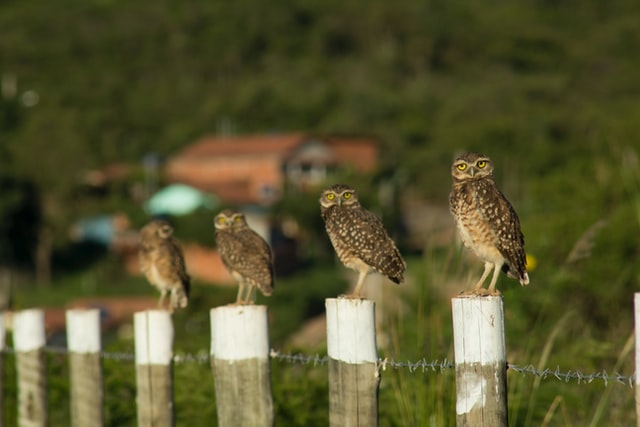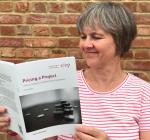There are many different Englishes – and there are Englishes within Englishes. The wise owls have turned their thoughts to their favourite features of dialects in England.

 Louise Bolotin*
Louise Bolotin*
I’ve been a sucker for a flat northern vowel ever since I watched Coronation Street as a kid (long ousted for EastEnders, whose mockney lacks the same appeal). I’m a southerner by birth so when I moved to Leeds in the 1980s I was thrilled to be called ‘duck’ by the Loiners and hear them rhyme bath with math(s). I have an unconscious tendency to mimic other people’s accents, so it wasn’t long before I started flattening my own vowels when in the company of northerners. I quickly added owt, nowt and summat to my verbal repertoire, and have been using them ever since because, well, they are just so much more succinct.
What I also love about northern dialects is the rich vocabulary – I’ve been in Manchester for more than 12 years now and I’m still learning the lingo. Words like bobbins (rubbish) and brew (a cup of tea) roll off my tongue as easily as fookin’ hell (no one swears quite as awesomely northernly as Liam Gallagher), often shortened to ‘kinell. However, I doubt my stepson would approve if I called him ‘our kid’. My absolute favourite is ‘out out’, as in ‘Are we going out, or out out?’ This is Mancunian for deciding how dressed up you ought to be for a night on the tiles.
Obviously, I still get confused when Mancunians say dinner when they clearly mean lunch; I’ve had some awkward attempts to diarise meetings thanks to that. But when I turn up for lunch/dinner, I’m as likely to greet my companion with ‘Yallright?’ as I am to say hi. I’ve lived far longer in the north of England, or Oop North, as I call it, than I have anywhere else, so the accents and vocabulary have left a bigger imprint on my brain than those of all the other
cities and countries I’ve lived in. And that’s not bobbins. Maybe one day I’ll be taken to be proper Manc.
 Hazel Bird
Hazel Bird
A variant of dialects that I find interesting is idiolects, which are
uses or coinages of words particular to individuals or small groups (such as friendship groups or families). They tend to grow organically out of day-to-day interactions, and unlike dialects they can be
cross-regional.
For example, I have just looked up the term ‘hoon’ in the Oxford English Dictionary and learned that it is an Aussie/Kiwi term for ‘behav[ing] in a loutish or irresponsible way; spec. to drive fast or recklessly’. However, by way of a link with rally car culture, my family has come to use it to refer to ruminant animals’ prancing across a landscape. Our definition is quite precise: sheep can hoon; cows, horses and such cannot.
We also use the word ‘puggle’ to refer to (1) the act of moving foodstuffs around a cooking pan to prevent them from adhering to the bottom or (2) fussing a cat. The OED has the meaning ‘to poke out’, which bears passing resemblance to (1) but not to (2). How we came to adopt these meanings is a mystery.
Another oddity is the spelling ‘baout’ (pronounced with extreme emphasis on each vowel) for ‘boat’. A baout can be a water-worthy object of any description, with the word denoting a sense of longing. However, like many dialect and idiolect words, it has a shared significance that is hard to put into words.
I often encounter dialect and idiolect words in my creative non-fiction editing work. When
used well, their effect can be powerful, conveying intimacy, alienation or a little of both.
They can make the reader the author’s closest confidante or deliberately shock them into
a new perspective.
 Melanie Thompson
Melanie Thompson
Nah then, mardy bum! There are often discussions in the CIEP forum about whether it’s permissible to quote song lyrics, but in this case the famous line is part of my childhood vernacular, and if you tell me I can’t write it, I’ll get a reyt face on.
One of the biggest thrills of my life was to hear that line sung at full throttle by the passengers on the crammed tram conveying myself and my (then) teenage son to hear Arctic Monkeys play in their (and my) home town: Sheffield.
Unlike the next-most-famous city band (the Human League) who adopted the ubiquitous
1980s musicians’ twang, Arctic Monkeys are proper tykes who know how to pronounce Beauchief (Beechiff) and will know that they need to pack their brollies if someone tells them
it’s silin’ it dahn.
Lots of people think they can ‘do’ a Yorkshire accent by splatterin’ apostrophes awl o’er t’ro-ad but Sheffieldish doesn’t work quite like that. Indeed, there are regional variations even within the city boundaries depending on whether the speaker hails from the northern or southern side – and it’s nothing to do with whether they support the Owls or the Blades.*
TV and radio programmes often fail to do the Sheffield accent justice: not all shows can afford Sean Bean (sadly!). But to hear a bit of authentic Sheffield banter, try Tom Wrigglesworth
and ‘family’ on BBC Radio 4. Every time I hear Tom’s fictitious dad answer the phone with ‘Sheffield 973629’ I am transported 150 miles north! (Why do my older northern relatives recite their number?)
I had the full force of my Sheffield accent elocutioned out of me, as a teenager, but my dad is an aficionado. This has been known to cause major confusion among his southern careworkers, but the fuss is usually somert and nowt, such as a mix-up between putting something o’r’ere or o’r theer.
To me, dialects are not just about words and pronunciation, but a way of life – some of which is sadly now dwindling.
Back in the day, my nannan used to gerron t’bus to go shoppin’ dah’n’t’cliff armed wi’a bag o’spice to share with the other passengers! She’d gerroff and buy some breadcakes, peys, a pound of tripe and a bottle of Hendo’s, then reverse the journey to be home in time for dinner.**
As I set off out to play, my mum might have told me not to get my clo’e’s loppy from scrawmin’ around in’t’ gennel; and if a friend later called round for me, the response would be ‘She in’t-in’.
Dialects can be problematic in formal writing and speaking, but they are a matter of great local pride and shouldn’t be regarded as a lesser form of English, in the right context. Nuff said?
Ah’ll si’thi’!
* Sheffield Wednesday and Sheffield United football teams
** My grandmother would get on the bus to go shopping at Attercliffe, carrying a bag of sweets … to purchase bread, peas, tripe and the local delicacy Henderson’s Relish [try it on pie!], and return in time for lunch.
 Sue Littleford
Sue Littleford
It is my abiding regret that I wasn’t born in my grandmothers’ generation so far as dialect goes, to hear their grandmothers speak. Alas, I am a child of the Fifties, by which time dialect was fading rapidly, and almost gone from my little corner of Hyde, a Pennine foothills mill town eight miles east of Manchester. We were in that select group of people that says scoan, not sconn (much smaller geographically than I ever imagined), and we had ginnels (though not as generally defined – ours were always covered). A buffet (pronounce that T!) was a broad, low wooden stool, an exceedingly useful article, especially for a tiny kid as, if you turned it upside down, you could sit on the underside, surrounded by rather solid framework, and pretend it was a rowing boat. I’m delighted to find it in Oxford Dictionaries at definition 3 (sans boat) and the etymology appears to be Old French into Middle English 600 years ago.
Mum kept an odd bit of grammar going well into the present century. She’d say ‘When I’m waken’ for ‘When I awoke’. And I distinctly recall a small schoolfriend (we must only have been six or seven) tell someone to ‘Stop thy skrikin’ ’ – a term that wasn’t used in my house, a couple of hundred yards away (not metres, back then), but was easy enough to figure out (‘Cease that noisy crying, forthwith!’) and if you couldn’t, well, it’s in Collins. Its etymology is harder to find, but it looks like being Old Norse for, not very excitingly, to scream or cry. We were just within the Danelaw, back in the day, so that sounds about right. Of course, the people around me didn’t speak a dialect, just as we didn’t have an accent – we just spoke how we spoke, but we knew it wasn’t like those posh folk on the wireless or telly – unless it was for comic effect and Marriott Edgar was being recited (I gave this monologue at a school show, and that was accent, really, not dialect). I’ve been living away for too long now to retain any strong linguistic links to home, and though I do still rhyme grass with crass, and bath with math, I no longer rhyme book with souk. Thanks for a lovely nostalgia trip!
*Louise Bolotin died in October 2022; her contributions are much missed.
The wise owls pop up on the blog every couple of months to reflect on their experiences on various topics. All are Advanced Professional Members of the CIEP.
Posted by Abi Saffrey, CIEP blog coordinator (who is quite a fan of bishy barnabees).
The views expressed here do not necessarily reflect those of the CIEP.
